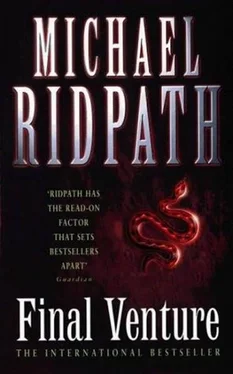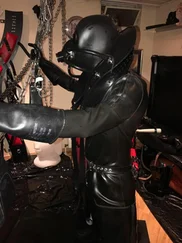I nodded.
'Come through.'
He led me rapidly down the corridor towards his office at the end, looking quickly from side to side, as if he was scared that someone would see us. We passed the door to Lisa's lab, and I hesitated in front of it.
'This way,' urged Henry, and I followed him.
Henry's office was a box of paper and computer equipment with a small desk and two chairs. I sat in one and he sat in the other.
Henry blinked at me. 'I hear Lisa's left you. I'm sorry.'
'So am I,' I said. 'I also hear she's left you. Or rather you dumped her.'
'It's true, we have gone our separate ways,' Henry said coolly.
'Why did you do that? Didn't she do the important work on BP 56?'
Henry sighed. 'Your wife is a very intelligent woman. She made a tremendous contribution here. We will miss her greatly' He hesitated. 'I will miss her greatly'
'Then why did you fire her?'
'I didn't fire her, Simon. BioOne is a very different company from Boston Peptides. She wasn't going to fit in. That became obvious.'
'But why didn't you stand up for her?'
'There was nothing I could do.'
'Henry! You were her boss. You could have gone too. But I suppose you didn't want to lose those stock options.'
Henry Chan's bewildered eyes suddenly focused on me. For a moment I thought he was going to throw me out before I had had a chance to ask my questions. Then he took off his glasses and slowly rubbed his eyes.
'You're right, I do have stock options. But I did seriously consider resigning. The thing is, Boston Peptides is everything to me. I've devoted my academic career to it. My house is mortgaged to the rafters for it. And with BioOne's support, I believe I can make something of it in a couple of years.'
'Boston Peptides meant a lot to Lisa too,' I protested.
'Oh yes. I know it did. But when BioOne took us over we both had a choice: we could either fight them and lose, or stick with them and make something out of our technology. Lisa decided to fight. I decided to stick it out. Believe me, I don't like the way they do things any more than Lisa does.'
'What is it Lisa didn't like?' I asked. 'She didn't tell me precisely. She just said something about how the company stinks. She wasn't specific'
'I'm sorry, I can't be either, Simon. Remember I work for BioOne now'
'You've heard about Lisa's father's murder?'
Henry nodded, a slow downward movement of his huge head.
'I'm sure you also know that I'm the principal suspect?'
Another nod.
'Well, now someone else at Revere has been killed. And I think the connection between the two murders might have something to do with BioOne. I'm trying to find out what that is.'
'You're trying to prove your innocence?'
'Yes. But not just to the police. To Lisa. I need to get her back.'
Henry looked at me thoughtfully. 'OK. But what I tell you doesn't go any further than this room, and you mustn't name me as your source, whoever you talk to.'
'All right. Tell me a bit about BioOne.'
'What do you want to know?'
'What's wrong with it? I've heard some of what Lisa has had to say about it, but I'd like your opinion.'
Henry paused. 'I think what we both find most difficult is the secrecy. You see in an ideal world scientists would share their discoveries with their peers as and when they make them. That way the scientific world as a whole can progress much faster than any one scientist working in isolation. But this isn't an ideal world, especially in biochemistry. Even in academic institutions scientists are jealous of their research. They're constantly afraid that someone else will steal their ideas, publish a paper first, attract research funding that should be theirs.'
'I can imagine,' I said. Lisa had frequently talked about the politics of academia.
'Now, once you start talking about companies with stockholders and stock prices and patents, then openness of information becomes even more difficult to achieve. To successfully file for a patent, a company must show that its process or drug is not "prior art". The best way of ensuring that is to tell no one anything about it until the patent is safely granted.'
'But all biotech companies must be secretive,' I said.
'That's true to some extent. Although at a place like Boston Peptides we don't make a big issue of it. We're not going to do anything stupid to jeopardize our patents, but we're all here to find a treatment for Parkinson's disease, and if we can help other scientists without harming the prospects for our own projects, we will.'
'So what's the problem?'
'BioOne is different. Their whole culture is permeated with secrecy. It's extraordinary. There are dozens of scientists working in different groups who are allowed no contact with one another. All their research results are passed to the centre, and they are only made available to others in the company on a need-to-know basis. And it's set up so most people don't need to know.'
'Why?'
'Divide and rule. Create an atmosphere of competition and insecurity that will produce results. But most of all, it concentrates all the power in the centre. With Thomas Enever.'
'Enema?'
Henry smiled. 'I have heard him called that. He's the only one who really knows what's going on in the firm.'
'What about Jerry Peterson, the chairman?'
'I dealt with him when we were selling out to BioOne. He has no idea what's really going on. Neither does your man, Art Altschule.'
I digested this information. 'But surely some things must be made public? The company is quoted after all. And doesn't the Food and Drug Administration need data from the clinical trials?'
'Oh yes. The FDA needs truckloads of information. But most of that comes from the Clinical Trials Unit, which is the most secretive department of the lot. They report directly to Enever and no one else.'
'What's this Enever like? I've only met him briefly. Lisa said he got caught fiddling some experiment results a few years ago.'
'That was never proved,' Henry replied. 'He published some research showing that neuroxil-3 might reduce the production of free radicals in the brains of patients with Alzheimer's.'
'Neuroxil-3 was an early form of neuroxil-5?'
'More or less,' Henry replied. Anyway, other scientists couldn't reproduce the results, and a year later Enever was forced to publish a retraction. It caused a bit of a stir, but Enever was never shown to have actually manipulated the data.'
'What do you think happened?'
'I think he succumbed to the oldest temptation for any scientist. Wanting a certain result so badly that he fails to notice contradictory data.'
'I can see Lisa wouldn't like all this. But how did she get herself fired?'
'You know Lisa. She asked difficult questions.'
'About neuroxil-5?'
'Yes.'
'What was wrong with it?'
Henry leaned back in his chair as far as he could, which wasn't very far in his cramped office.
'I don't think there is anything wrong with neuroxil-5,' he said carefully.
'But what about Lisa? What did she think?'
'She badgered Enever into letting her look at some of the research data for neuroxil-5. She wanted to see whether it could be used to treat Parkinson's. Then she had some questions about the data. You know what Lisa's like; she doesn't stop until she has the answers she wants.' Henry smiled to himself. 'You have to know how to handle her. I guess Enever didn't have the patience for it.'
'So he fired her?'
'Yes. She didn't know where to stop. I tried to tell her to give up on it, but she wouldn't listen.'
'And what specifically was she worried about?'
'I can't say,' said Henry, looking at me carefully.
'What do you mean, you can't say?'
'Look, Simon. Neuroxil-5 is at the heart of BioOne's research programme, you know that. I can't tell you anything about it that isn't publicly available. Especially if it is only unsubstantiated guesses.'
Читать дальше












